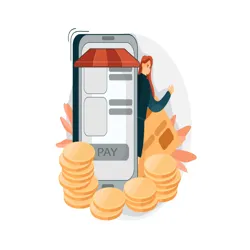TABLE OF CONTENTS
- Merchant Account Holds vs. Merchant Account Freezes
- How Long Can a Merchant Account Provider Hold Funds?
- The 4 Main Reasons for a Merchant Account Hold or Freeze
- How to Handle an Account Hold or Freeze
- 5 Ways to Prevent an Account Hold or Freeze
- What to Do in the Event of a Merchant Account Termination
The event of a merchant account hold, freeze, or termination can result in some nightmare situations for business owners: cash flow problems at best and a complete loss of payment processing capabilities at worst. This guide explores merchant account holds and freezes, how to handle and avoid them, and the various reasons why they occur, as well as what to do in the event of complete account termination. Keep reading to find out how to keep your red-hot merchant account from getting iced.
Merchant Account Holds vs. Merchant Account Freezes

Many businesses reference merchant account holds and freezes interchangeably; however, there are differences between the two.
In the event of a merchant account hold, your provider holds your existing funds rather than depositing them into your business bank account. Likewise, newly processed payments will be automatically held, meaning that your business won’t have access to its transaction funds until the processor concludes their investigation of your account. Upon release of the hold, funds will be transferred to your business bank account.
Note: Check out our explainer on the differences between a merchant account and a business bank account if you’re confused about why you need both accounts.
On the other hand, a merchant account freeze is a more serious issue. When an account freeze occurs, not only are your funds held by your merchant account provider, but your business will also lose access to its payment processing capabilities. This means you won’t be able to accept credit card payments until your provider concludes their investigation of your account. Not only does this prevent you from accessing cash flow, but it can also limit your ability to accept payments and impact your relationship with customers.
After a merchant account hold or freeze, the processing bank may terminate your account. If a provider concludes that it no longer wants to offer processing services to your business, you will lose access to its platform altogether. In this case, your account provider may hold your funds for up to 180 days to cover possible refunds, chargebacks, and other potential financial losses.

Be aware of deposit delays and reserve accounts
Merchant account providers use tools such as deposit delays and reserve accounts to mitigate payment risk. However, these tools are not a result of holds, freezes, or terminations. They are commonplace in the industry, even for businesses with excellent processing histories.
Deposit delays occur when a processor automatically delays access to funds from purchases for a pre-determined amount of time. (Seven days is common.) This ensures that your processor has access to the funds if fraud or other payment issues should arise.
Meanwhile, reserve accounts are pre-funded accounts. These accounts cover the costs of chargebacks, returns, and other payment disputes after the associated merchant account has closed. Reserves are frequently a requirement for high-risk merchant accounts because of the increased liability involved. A reserve account reduces your processor’s financial exposure by setting aside a percentage of your sales into an account that you can’t access. This way, if there are payment-related debts you cannot cover, the processing bank has a safety blanket to fall back on.
Unlike holds, freezes, and terminations, delays and reserves aren’t implemented because of suspicious transactions or an upsurge in chargebacks. Still, it’s important to understand the terms of deposit delays and merchant account reserves so you can anticipate their impact on your business’s cash flow.
How Long Can a Merchant Account Provider Hold Funds?
So, your business is experiencing a merchant account hold or freeze. What’s the time limit on how long your funds can be held? Unfortunately, most payment processors reserve the right to hold funds until their investigation is complete. As the length of time is dependent on the investigation and is thus unpredictable, it’s challenging to predict when and even if you will regain access to your business’s money or processing capabilities. However, you can help speed up the process by immediately contacting your processor and providing information upon their request.
In the case of account termination, the rules are slightly different. A merchant account provider can withhold funds after account termination to ensure it has enough money to cover any potential refunds or chargebacks. In most cases, after 180 days, your provider will return your funds, as this is long enough to reasonably exclude the possibility of future financial losses.
While this may seem unfair, it’s in the terms and conditions of your merchant account agreement. Upon signing, you agree to be subject to funding holds and freezes if you don’t follow the specified parameters of the contract. However, this isn’t an issue exclusive to merchant accounts. In fact, many payment service providers (PSPs) actually have a larger reputation for freezing accounts due to their low tolerance levels for risk.
The 4 Main Reasons for a Merchant Account Hold or Freeze
While there are several reasons a merchant account hold or freeze may occur, below explores the four most common reasons.
1. Merchant Agreement Violation
When you sign up for a merchant account, you agree to abide by the provider’s terms and conditions. Violating an agreement with the provider may result in an account hold, freeze, or termination. So, what are some examples of merchant agreement violations?
- Prohibited Industries or Products: Many merchant service providers have strict guidelines on prohibited industries and products. This is because certain industries have higher chargeback ratios and a heightened risk of fraud, making them unattractive partners in the eyes of financial institutions. So, selling forbidden products or services can lead to an account hold, freeze, or termination.
- Prohibited Marketing Tactics: If your business engages in false advertising or other prohibited marketing tactics, your provider may freeze your account. For example, advertising that your CBD products can cure anxiety is false advertising.
- Causing Reputational Damage to the Payment Processor: If your business engages in activities that reflect poorly on your payment processor, it may result in an account freeze or termination. Examples of this include using hate speech, participating in fraudulent industries, and similar activities.
Make sure to read your merchant agreement closely before signing up for an account. Ignorance is not a suitable defense if a provider suspends your business.
2. Excessive Chargebacks
Chargebacks are another common reason for account holds, freezes, and terminations. A chargeback is initiated after a cardholder (or customer) disputes a charge on their credit card. While chargebacks can be the result of stolen credit card data and other fraudulent activities, others may indicate that your business is misrepresenting products, failing to deliver goods, or engaging in other improper business activities. Since excessive chargebacks may indicate fraudulent practices, processing banks can be sued by card issuers and other payment stakeholders if they partner with merchants who have extreme chargeback ratios.
Regardless of the reasons for chargebacks, and even if the business owner is not at fault, payment processors view them unfavorably. For this reason, it’s wise to implement a chargeback prevention strategy. Using two-factor authentication and other fraud prevention tools can help your business prevent chargebacks.
3. Suspicious Activity
Suspicious activity can result in account freezes pending an investigation by the processing bank. Processors have extensive experience spotting payment patterns and other issues indicative of fraud. For example, if your business suddenly begins processing much higher volumes than previously, your processor may flag this as suspicious because fraud typically occurs within high transaction volumes. Likewise, if your business starts accepting excessive amounts of overseas transactions, this may also indicate suspicious behavior.
So, what’s the remedy for this? Communicating with your payment processor in advance about abnormal transactions and shifts in processing volume can help you avoid account holds and freezes as a result.
4. Surpassed Processing Parameters
Payment processors often dictate parameters in merchant agreements to avoid unnecessary risk from new merchants. For example, your business’s payment processor may only allow your business to process up to $10,000 per month upon opening a merchant account. There may also be restrictions limiting the total amount of a single transaction. This ensures a large chargeback doesn’t impact the processor’s bottom line.
You can avoid exceeding any applicable limits by monitoring your processing parameters, detailed in your merchant agreement. Further parameters consist of restrictions on surcharges and clear refund policies.

Does personal credit impact a merchant account hold?
No, your personal credit score will not impact a merchant account hold. Once approved for an account, the payment processor will be more interested in your business’s activities than your credit history. However, personal credit still matters. Your provider may assess your personal credit score when reviewing your initial application for a merchant account. Business owners with poor personal credit histories may face account restrictions or rejection. That said, maintaining a strong personal credit score is important if you want to apply for a merchant account in the future.
How to Handle an Account Hold or Freeze
Handling a merchant account hold or freeze correctly can reduce its impact on your business. So, let’s explore some tips and tricks for properly dealing with this issue.

Investigate Why It Happened
First, explore the factors that resulted in the hold or freeze. In most cases, your provider will outline the reasons for account suspension. For example, they may disclose that your business is currently exceeding its chargeback threshold. With this information, you can address the excessive chargebacks currently against your business and create a chargeback mitigation plan to avoid this in the future. Understanding the core issue is necessary before you can begin reinstating your account.
If your payment processor doesn’t provide information about your suspension, seek immediate clarification. The sooner your business can begin preparing to dispute the account hold or freeze, the quicker you can regain access to your funds or payment processing capabilities.
It’s also beneficial to work with a merchant service provider offering around-the-clock support. If an issue arises, immediate access to dedicated support is pertinent!

Explore Alternative Payment Options
Begin searching for payment alternatives to ensure your business doesn’t miss out on sales. High-risk merchant accounts are a great backup option because they are familiar with problem-prone businesses.
While payment service providers offer a quick application process, they don’t issue individual merchant accounts. This results in a lack of dedicated customer support, slow transfer times, and higher processing fees. Furthermore, payment service providers are known for terminating accounts with little to no warning. In fact, PayPal recently faced a lawsuit for freezing funds without providing an explanation.[1]BNN Bloomberg. “PayPal sued for freezing customer accounts without explanation“. Accessed March 28, 2023.
This happens so frequently because there’s no official approval or vetting process with payment service providers. Accounts aren’t fully reviewed until after they’re approved. As a result, many are terminated once they are finally reviewed after approval. Still, using a payment service provider as a short-term solution while you look for another merchant account can help bridge payment capability gaps.

Dispute Chargebacks
Merchant account holds, freezes, and terminations are often the result of excessive chargeback ratios. Unfortunately, not all chargebacks are legitimate, and scammers use them as a method to receive refunds while retaining the purchased product. Because of this, disputing fraudulent chargebacks is important.
If you choose to dispute the chargeback, your processor will request additional information about the transaction. For example, if a cardholder claims the purchase resulted from stolen credit card details, a processor will request information you have that disproves this claim. Once you collect all relevant information, write a letter outlining your case and submit it to your payment provider.
Overturning chargebacks is no small task. However, it’s worthwhile, especially if your merchant account is frozen as a result of chargebacks.

Partner with Another Merchant Services Provider
If your merchant account provider is holding your funds, has locked your account, or has failed to acknowledge your demands to rectify the situation, it’s time to search for another provider. While we mentioned payment service providers as a short-term solution, these platforms aren’t the most suitable long-term option. Given their low tolerance for risk, there’s a high likelihood that long-term processing via one of these platforms, like Square or Stripe, will result in an account hold, freeze, or termination—leaving you right where you started.
On the other hand, merchant accounts offer a range of benefits, including lower fees, increased account stability, and dedicated support. As far as payment processing goes, merchant accounts are the cream of the crop.
Additionally, you shouldn’t be deterred by a recent account termination. Just because you deal with issues with one provider, doesn’t mean you will have the same issues with the next one. In fact, many high-risk merchant account providers will have the resources and expertise to help you avoid future account holds, freezes, and terminations.
5 Ways to Prevent an Account Hold or Freeze
By taking measures to prevent merchant account holds and freezes, your business can avoid payment outages, revenue loss, and other impactful resulting problems. Let’s explore the top five tips for preventing merchant account holds and freezes below!
1. Find a Specialized Payment Processor
Choosing a processing partner who understands your industry can help your business avoid account holds and freezes. Fortunately, there are high-risk merchant account providers who partner with various regulated industries (adult entertainment, tobacco, firearms, etc.). These types of providers understand the needs of high-risk businesses. They offer dedicated support, higher chargeback thresholds, and other resources to prevent account holds, freezes, and termination. Partnering with the correct merchant account provider is the most effective preemptive solution to avoiding account closures or payment suspensions.
2. Don’t Exceed Parameters
If your payment processor specifies parameters, remain within them. Develop an internal strategy for ensuring your business remains compliant. And remember, restrictions and other parameters are commonplace for new merchants. If your business doesn’t have an extensive processing history or you’re a first-time business owner, don’t be surprised if your merchant account provider implements processing limits. These parameters protect both you and your payment processor.
3. Maintain Detailed Records
Next, maintain detailed records at all times. Recording payment details, customer details, and other relevant information will help you resolve account freezes or terminations. Businesses with poor internal record keeping may suffer from unnecessary account holds and freezes.
Not recording this information can prove especially costly if a provider requires additional documentation because of a payment dispute. For example, if a customer files a chargeback, but you have IP address information or other authentication details proving the customer made the purchase, it will prove useful during the dispute process.
4. Abide by Your Merchant Agreement
Always abide by your merchant agreement. This is a no-brainer. As discussed, many merchant agreements include prohibited sectors, banned items, and account restrictions. However, merchant agreements are subject to change regularly. As such, regularly re-review your agreement, too. Your provider may update prohibited products and industries, and you don’t want to make the mistake of being uninformed about current restrictions.
5. Communicate with the Processor’s Risk Department
Lastly, communication can go a long way in preventing account freezes and holds. If you are nearing your parameter limits, you can avoid any issues by contacting your processor’s risk department. Many merchant account providers offer dedicated support, so it’s easy to speak to a representative about any potential issues.
Likewise, it’s good to always respond if your processor’s risk department contacts you for additional information. If you don’t respond to requests for documentation, your business may be subject to unnecessary account restrictions or suspensions.
What to Do in the Event of a Merchant Account Termination
In the disastrous event that your merchant account is terminated and you’ve lost processing capabilities, you’ll be itching to regain access to credit card processing as quickly as possible. Just imagine the look on a customer’s face when you tell them you cannot accept their credit or debit card payment. However, you’ll have no recourse for obtaining processing from the provider that just closed your merchant account, so you’ll have to find a new provider. Then, you’ll have to wait for your new provider to approve your account. And don’t forget about underwriting for your account, which can take weeks. Now, imagine all the looks on all your customers’ faces during the weeks you don’t have a payment processing partner. You shouldn’t wait for termination to prepare for termination. Having a backup processing option on hand can, quite literally, save your business. Take a proactive step and secure credit card processing capabilities with PaymentCloud today!







